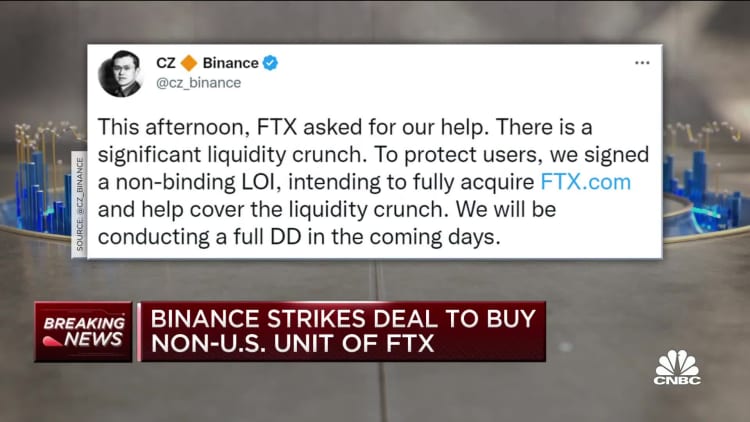FTT, the token native to crypto exchange FTX, lost most of its value after rival Binance, the world’s largest cryptocurrency firm, announced plans to acquire the company.
The coin traded at around $22 on Monday and sank below $5 Tuesday afternoon in New York. The sell-off wiped out more than $2 billion in value in the space of 24 hours.
Binance CEO Changpeng Zhao, known as CZ, wrote in a tweet to his more than 7 million followers that he expects FTT to be “highly volatile in the coming days as things develop.”
Cryptocurrencies as a class sank on Tuesday, with bitcoin and ethereum both plunging more than 10%. Shares of crypto exchange Coinbase also experienced a double-digit percentage drop, while Robinhood, which traders use to buy and sell crypto, fell by about 19%.
“It’s probably the most dramatic deal I’ve ever seen in the history of the crypto industry,” said Nic Carter, a partner at Castle Island Ventures, which focuses on blockchain investments. “It consolidates basically the two largest offshore exchanges into one entity, an absolute coup for CZ and Binance — and really a disaster for FTX.”
The agreement between the two companies is nonbinding and follows what FTX CEO Sam Bankman-Fried called “liquidity crunches” at his firm, which was valued at $32 billion in a financing round earlier this year.

The acquisition affects only the non-U.S. businesses for FTX. The U.S. division will remain independent of Binance. However, according to a 2021 audit, the U.S. part of FTX accounted for just 5% of total revenue. FTX is based in the Bahamas, where Bankman-Fried resides.
Like many crypto companies, FTX created its own token called FTT, which could be purchased like bitcoin though it wasn’t as widely available. Owners of FTT were promised lower trading costs and the ability to earn interest and rewards like waived blockchain fees. While investors can profit when FTT and other coins increase in value, they’re largely unregulated and are particularly susceptible to market downturns.
In 2019, Binance announced a strategic investment in FTX and said that as part of the deal it had taken “a long-term position in the FTX Token (FTT) to help enable sustainable growth of the FTX ecosystem.”
Because of Binance’s central position in crypto and its large ownership of FTT, the company had particular sway over FTX and the market’s view on the company. Investor confidence in FTX was rocked over the weekend when Zhao tweeted that Binance would sell its holdings of FTT.
Zhao said Binance had about $2.1 billion worth of FTT and BUSD, its own stablecoin.
“Due to recent revelations that have came to light, we have decided to liquidate any remaining FTT on our books,” he said.
FTT, which peaked at around $78 in September 2021, was trading at close to $25 the day before Zhao’s tweets. It plunged below $16 on Monday and then fell off a cliff after the deal got announced Tuesday. According to CoinMarketCap, the value of FTT’s circulating supply is about $735 million, down from $2.9 billion on Monday.
Bankman-Fried said that in the 72 hours leading up to Tuesday morning, there had been roughly $6 billion of net withdrawals from FTX, according to Reuters. On an average day, net inflows are in the tens of millions of dollars.
“The fact that Sam was willing to do this deal suggests that FTX was deeply impaired in terms of the run on the bank that began in the last 48 hours,” said Carter. “We don’t know exactly what the issue was, whether they were lending out or gambling with user deposits.”
FTX did not respond to CNBC’s multiple requests for comment.
Earlier on Tuesday, FTX had halted withdrawals from its platform, after spooked investors attempted to pull their funds — in a move that resembled the collapse of other crypto firms this year, including Celsius, Voyager Digital and Three Arrows Capital.
News on FTT sparked concern about Alameda Research, Bankman-Fried’s trading firm and sister company to FTX. A report last week on the state of Alameda’s finances showed a large portion of its balance sheet is concentrated in FTT and its various activities leveraged the token as collateral. Alameda has disputed that claim, saying FTT represents only part of its total balance sheet.
“If the price of FTT goes way down, then Alameda could face margin calls and all kinds of pressure,” said Jeff Dorman, chief investment officer at digital asset firm Arca. “If FTX is the lender to Alameda then everyone’s going to be in trouble.”
— CNBC’s Kate Rooney and Tanaya Macheel contributed to this report.


